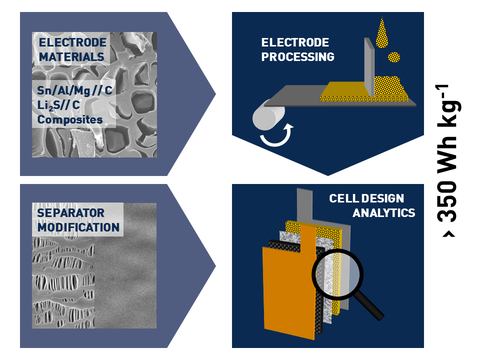Carbon nanocomposites for high capacitive lithium sulfur batteries (Composite-S-Power)
Duration: November 2013 - January 2015
Lithium-Sulfur (Li-S) batteries have great potential to replace the presently used Lithium-intercalation (“Lithium ion”) technology as they have a remarkably higher energy density. However, for the commercialization of this cell type, several challenges have to be overcome that are mainly attributed to the very complex chemical (side) reactions during electrochemical cycling of these batteries. The aim of this young academic research group is to investigate the above mentioned mechanisms in detail and the development of specifically tailored materials, cell concepts and process techniques in order to establish Li-S batteries as future energy storage systems. Main issues of the interdisciplinary research work comprise studies on electrode materials, electrolytes, electrode processing and cell design in order to create a battery cell with a specific energy density value of at least 350 Wh/kg.
M. Sc. Marion Adam - Development of new carbon materials based on biological templates
M. Sc. Felix Hippauf - Electrolyte development and investigation of polysulfide adsorption at carbon materials
M. Sc. Ingolf Bauer - Development of new separator membranes
M. Sc. Winfried Nickel - Synthesis and characterisation of porous carbon with defined porosity
M. Sc. Patrick Strubel - Synthesis and characterisation of Li2S composites via prelithiation
M. Sc. Grzegorz Parzych - Synthesis and characterization of Sn/C bzw. Mg/Al/C composites as anode material
Dipl. Chem. Martin R. Lohe - Solid state characterisation and post-mortem analysis of the electrode and separator materials
This work is funded by the European Social Fund ESF (Europäischer Sozialfonds) and the Free State of Saxony (Sächsische Aufbaubank – SAB, Projektnummer 100111064.)



